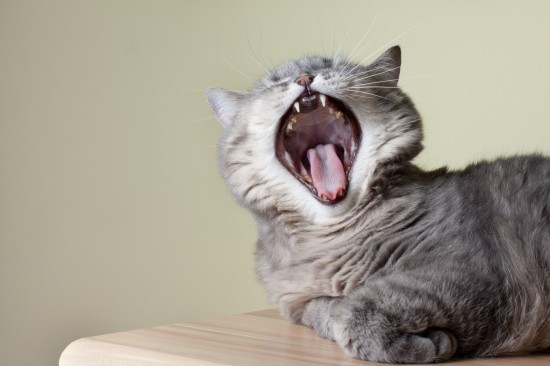

While any cat that has just eaten something strong smelling such as tuna or a particularly fragrant cat food will naturally smell rather less than minty fresh for a short period afterwards, having bad breath is not a normal state of being for the cat, and not something that cat owners should automatically write off as being acceptable. Good dental hygiene for cats is as important as it is for people, and while mature cats that have never undergone a dental care regime or benefited from regular veterinary dental care and cleaning will likely have bad breath caused by problems with the teeth and gums, dental issues are only part of the picture.
There are several different reasons for why any cat may be suffering from halitosis, and while problems with the teeth and gums themselves are the most common of these, there are other factors to consider as well. Read on to learn about the top five reasons for bad breath in cats.
If your cat is suffering from bad breath, considering the condition of their teeth and gums themselves should be your first port of call. Cats under the age of five rarely suffer from significant tooth and gum problems and bad breath unless an underlying issue is causing this (such as immune system issues) but older cats that have not undergone an ongoing tooth and gum hygiene protocol from a young age are particularly prone to them. Rotting or damaged teeth, significant plaque, gingivitis and inflamed gums all indicate dental problems in the cat, and by this stage, starting a home dental care regime will not be sufficient to address the issue. If your cat appears to eat delicately (particularly when eating hard food) or drop a lot of the food that they pick up, the condition of the teeth and gums is probably the issue.
Schedule a veterinary appointment to assess the condition of your cat’s teeth, which may result in their needing to undergo a thorough dental cleaning and maintenance procedure. Avoid getting to this stage in the first place by feeding a food that helps to care for your cats teeth, getting them used to tooth brushing when young, and keeping an eye on the condition of their mouths as they age.
Diabetes in cats is another condition that can lead to bad breath, which often has a distinctive and recognisable smell. Diabetes is caused by the body being unable to produce or correctly process insulin, which is required for the normal digestion of food. As the condition progresses without treatment, the body begins to metabolise its own fat stores to acquire the nutrition it requires, leading to an often rapid weight loss, extreme thirst and increased urination. This process is known as ketosis or ketoacidosis, and can lead to the breath taking on a strong and unusual aroma that can be described as vaguely sweet but rotten smelling, acidic, or like the smell of acetone or pear drops. Your cat will require veterinary diagnosis to confirm diabetes, and they will need to begin a tailored treatment protocol to correct the condition.
Problems with the kidneys such as infections and renal disease most commonly affect cats that are mature, and can lead to either the acute or chronic shutdown of the kidney’s functions. This condition is irreversible, but if chronic kidney failure is identified early enough, the cat’s healthy lifespan can be increased with treatment to help to assist the remaining kidney function.
Because renal failure in cats means that the cat’s kidneys are unable to adequately eliminate toxins from the bloodstream and pass them out in the urine, increased water intake and urination accompany the condition. The build up of toxins within the body can also lead to a fairly sudden onset of particularly strong bad breath, which is foul smelling and quite distinctive.
Cats that are having problems with their digestive system or gastrointestinal system will suffer from a range of problems, which may include sickness and diarrhoea. Often, however, if your cat simply has a sensitive stomach and is not being fed a food that suits them, or if they have allergies to some of the ingredients of their food, symptoms can be hard to spot.
A generalised low to medium level digestive discomfort in the cat will often be asymptomatic, but can present itself as bad breath if things going on within the stomach and intestines are not quite right. Calicivirus, a gastro-intestinal infection of the cat is one of the potential causes of this.
If your cat’s breath is bad but their teeth and gums appear to be in a reasonable condition and they are displaying no other symptoms, you may have to investigate the possibility of a food sensitivity or digestive problems.
Finally, some cats can be prone to mouth ulcers, sores and cysts within the mouth just as people can, and these do not always accompany dental problems or bad oral hygiene. Understandably, sores or ulcers within the mouth can lead to bad breath as well as pain and discomfort, and may lead to secondary infections that can be quite pronounced, as the mouth is of course a bacteria-heavy environment.
Get your cat checked out by the vet, to ensure that any problems within the throat and mouth are addressed and treated, and any underlying causes identified.
Copyright © 2005-2016 Pet Information All Rights Reserved
Contact us: www162date@outlook.com